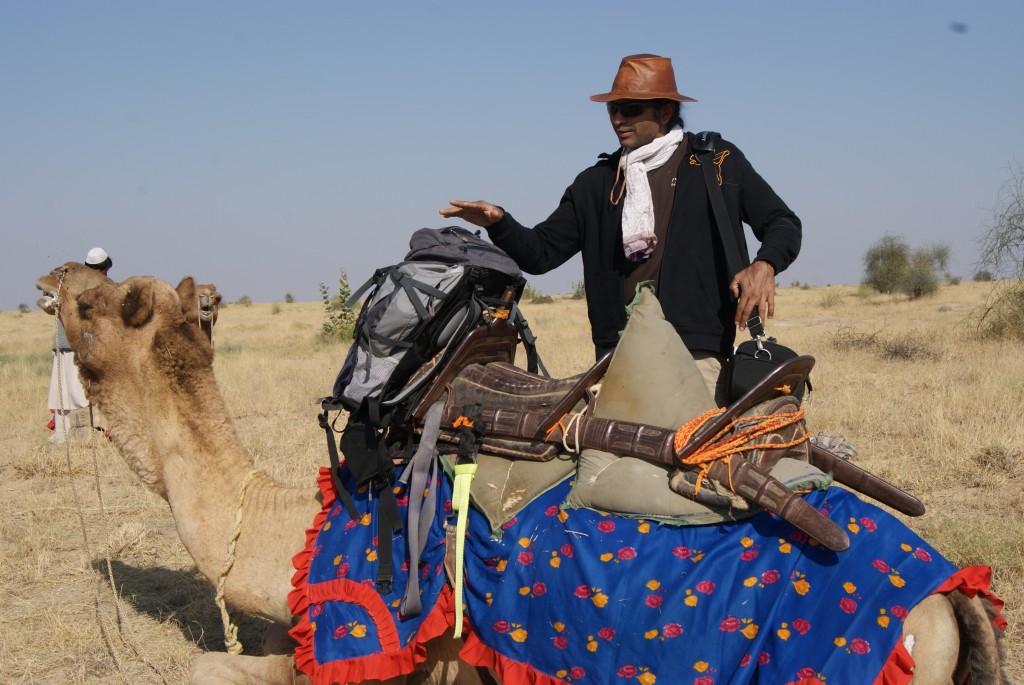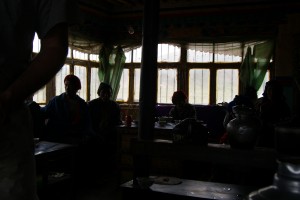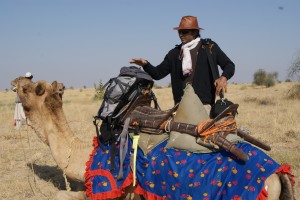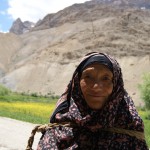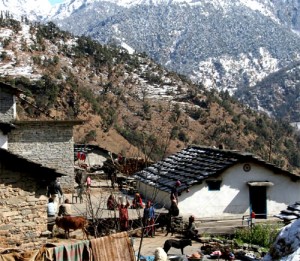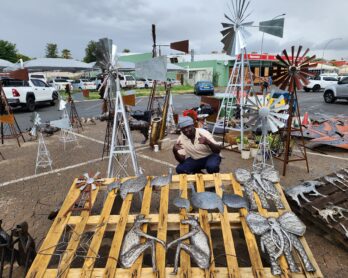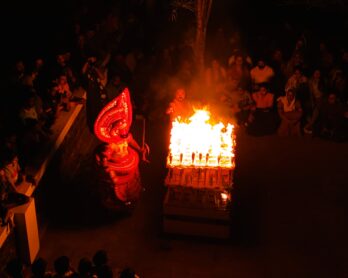All I said was ‘Tashi Delek!’
Now my camera batteries were getting charged. I polished off one serving of special momos (momos with more meat and an extra helping of blazing-hot chutney), washed down with strong Tiger beer. I was fleece-fitted snugly in the midst of Sherpas and porters – the kind of crowd you ought to hang out with when you are in a mountain country like Tibet, was being regaled with lambent accounts of obdurate climbers and miraculous escapes. It was a wholly different story just a few hours before; the batteries were wedged in my armpits hoping the warmth would conserve some of fast-ebbing power from the freezing cold of the damp tent. Like I said, all it took was one ‘Tashi Delek’ to plonk me right in Shangri La, given the circumstances.
Alright, maybe it was more my hapless state – I was soggy, groggy and down like a dog’s ear – and these Buddhist folks are the best of the lot. But there’s no discounting the power of a genuine attempt to get you across that moat of cultural and lingual barriers. Getting them to lower their guard, the bridge, across this ridge is at the root of responsible travel (RT). True, RT is not all about a local greeting or a few words that come in handy when you are lost but nevertheless it’s a good start. RT is going the whole hog that some call it ‘heart travel’ which I find a bit romantic like chasing a lover across the globe, perhaps. I would rather call it ‘conscientious travel’ assuming that there is a conscience. RT is a higher standard in travel, an elevated trip. Trips that wilfully create greater economic benefits for the local people and help in the conservation of natural and cultural heritage. It’s not a one-way handout; it’s about making travels more enjoyable and meaningful through deeper connections with the locals and a greater understanding of their culture, traditions and environmental issues.
Like in any happening industry, here too there are the rapacious opportunists and the genuinely committed ones. Two solar-powered water heaters and three wide-eyed locals are what many outfits try to pass off for their ‘ecotourism’ credentials. When it comes to putting together an itinerary, more so a responsible one, it’s very important that you are in the right hands, in good company. There are many organisations in India that are committed to get you more out of your travels by helping you make meaningful connections with the local people. They have their consciences (and hearts) in the right place when it comes to helping the indigenous communities and conserving culture, making the locals a part of the decision-making process which impacts their lives. These organisations understand very clearly that quality of tourism visits brings much more benefits to the community and the environment and to the traveller than quantity of tourism visits.
Different categories of RT were examined in the earlier post ‘Saving the world one trip at a time.’ The list was non-exhaustive but presented to bring to light that one attribute at the core of RT: least-invasiveness. Hence definitions understandably encroached into each others’ purview. Similarly, the organisations listed here under each category does not mean is a total omit from another; for example, Rural Pleasure listed under ‘rural travel’ can go under ‘agro tourism’ or ‘community travel’ even ‘heritage tourism’ considering the many historic sites to which they take you where you can contribute money or your time in its preservation. For purpose of segregation, RT has been broadly classified into ecotourism, altruistic travel and speciality tourism – a niche but fast growing branch of tourism covering areas such as music, art, food even graveyard.
The operators/organisations listed here are by no means comprehensive but some are personally known to do a good job and all have their hearts in the right place.
Ecotourism
Any tourism initiative that helps in the conservation of local culture and environment as well as foster community participation and is sustainable commercially qualifies to be an ecotourism project.
Community tourism: Village Ways created a very successful tourism model in the foothills of the Himalayas – where local communities partake in the work, pleasure and the profit of the tourism business they run. You are taken right to the heart of rural communities living the village life and getting a first-hand experience in the rural way of life.
Another heart-warming example is the Hodka Endogenous Tourism project in the Rann of Kutch promotes ‘local culture and craft-based tourism.’
Agro tourism: The Kishkinda Trust in Anegundi set up in 1997 recognised the immense potential of tourism to the nearby Hampi Heritage Zone as well as the needs for grassroots participation and development. In addition to performing arts and education, there are also courses in organic farming for tourists.
Culture tourism: The Kerala Kalamandalam founded by the poet Vallathol to revive the state’s rich performing arts tradition, offers not only courses but tours (‘A day with the masters’) which includes an AV on the institute’s history, performances and topped with a traditional Kerala lunch.
Rural travel: Rural Pleasure ensures that your visit to the hinterlands is not all about ploughing and harvesting but also about participation in the village festivities as well.
Heritage tourism: The rock cut caves of Ajanta and Ellora in Maharashtra are world famous and illustrate a degree of unparalleled artistry achieved by Indian craftsmen thousands of years ago. More information on tourism to these caves can be had from the Maharashtra state tourism website.
Altruistic travel
In altruistic travel, there’s more than just opening your wallet or writing a cheque. You can also invest your time and talent – teach a language, advice or counsel, impart professional training or help in constructing a school or a canal.
Voluntourism: There are organisations like Volunteers India which gives visitors the opportunity to combine ‘meaningful volunteering with an action-packed adventure.’ Ecosphere (www.spitiecosphere.com) has opportunities through which you can support sustainable livelihoods, nature, culture and traditions. Look up www.rosekanda.info and www.snmcpn.org for wider focus areas to support. However Transitions Abroad is the big daddy of all volunteering opportunities across the world with an exhaustive array of options depending on your skill set, interest and mindset.
Pro poor tourism (PPT): The ‘slum tour’ by Reality Tours and Travels through Dharavi in Mumbai, not only takes you up and close to Asia’s largest slum but also a lesson on the sense of community and will to survive against all odds.
Specialty tours
Art: The Arts Reverie in Ahmedabad may not be a usual arty-type hangout – it’s expensive – but must say is quite atmospheric and is a piece of brilliant restoration. You not only immerse yourself in the city’s stupendous heritage but also get to partake in the almost-daily shows by master craftsmen, poetry readings and cultural performances.
While arts and other performance-based festivals kick-off in robust numbers all over the country once autumn sets in, the iconic ones are the Kala Ghoda in Mumbai and the India Art Fair of Delhi.
Food: The parathewali galis and other gobsmacking savouries of Old Delhi come alive during winter. If you are not an old hand in the city, one great way to experience it would be by partaking in popular food trails like the ones by Delhi Magic.
Music: The music festival circuit in India is getting busier by the year with newer additions; holding fort are the Goan Sunburn, Fireflies Festival in Bangalore, Sulafest in Nashik and the Rajasthan International Folk Festival. I am still waiting for something like Diggin Melbourne – the vinyl lovers’ tour guide – in India.
Graveyard tourism: This is respect in its strictest sense. Tourists coming to trace the mortal remains of their ancestors, like in 2007 which was the 150th anniversary of the 1857 Mutiny. Descendants of the English officers who died in the historic uprising arrived in India to locate the graves of their great grandfathers and grand uncles. Calcutta Walks organises graveyard tours and offers to trace the remains of ancestors which is also about ‘recreating the life and times of the departed soul.’
Before organising your tours with any of the travel operators mentioned here, readers are requested to make your own queries as to the contributions they make towards helping local communities and in the conservation of the environment. When checking in, do not be swayed by that one native by the entrance but make sure they walk the talk.
This is the third of a four-part series on responsible travel; the fourth and final part is on reconciling the seemingly divergent luxury travel with responsible practices.


